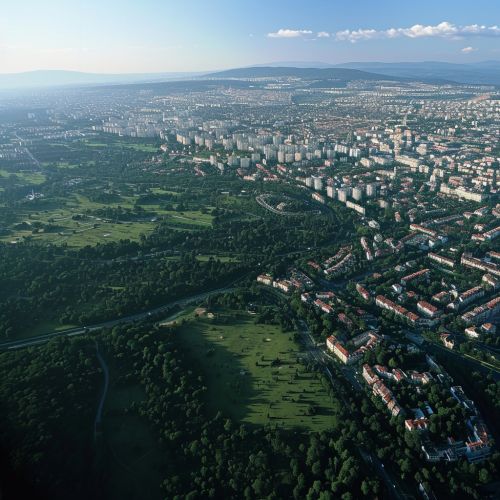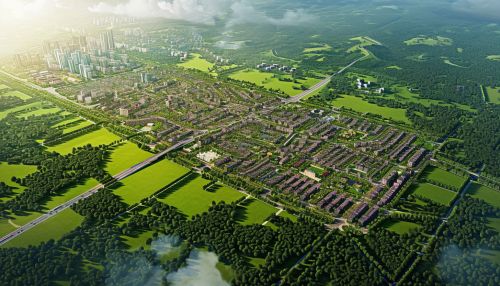Effects of Urbanization on Environment
Introduction
Urbanization, the process by which large numbers of people become permanently concentrated in relatively small areas, forming cities, is a global phenomenon that has had significant impacts on the environment. The effects of urbanization on the environment are numerous and complex, with both positive and negative consequences.
Causes of Urbanization
Urbanization is primarily driven by economic development and growth. As countries industrialize, they experience a shift from rural-based economies to urban-based economies. This shift is often accompanied by a population migration from rural to urban areas. Other factors contributing to urbanization include social factors such as improved healthcare and education in cities, and environmental factors such as climate change and natural disasters, which can make rural areas less viable for agriculture and other traditional rural livelihoods.
Environmental Impacts of Urbanization
Land Use Change
One of the most immediate and visible impacts of urbanization is the change in land use. As cities expand, they often encroach on previously undeveloped or agricultural land. This can lead to the loss of biodiversity, as habitats are destroyed or fragmented. Additionally, the conversion of land to urban uses can result in the loss of productive agricultural land, which can have implications for food security.


Resource Consumption
Urban areas are characterized by high levels of resource consumption, including water, energy, and food. This high level of consumption can put pressure on local and global resources, leading to overexploitation and depletion. For example, the high demand for water in cities can lead to the over-extraction of groundwater, resulting in lowered water tables and land subsidence.
Waste Production
Cities produce large amounts of waste, including solid waste, wastewater, and air pollution. The management of this waste is a major challenge for urban areas. Inadequate waste management can lead to environmental pollution, with impacts on air, water, and soil quality. Additionally, the production of waste contributes to global environmental issues such as climate change, as waste decomposition produces greenhouse gases.
Urban Heat Island Effect
Urban areas often experience higher temperatures than surrounding rural areas, a phenomenon known as the urban heat island effect. This is due to the high concentration of buildings and paved surfaces, which absorb and re-radiate heat, as well as the lack of vegetation, which provides cooling through evapotranspiration. The urban heat island effect can exacerbate the impacts of heatwaves, leading to increased energy consumption for cooling and potential health impacts.
Impacts on Water Cycle
Urbanization can also impact the local water cycle. The high proportion of impervious surfaces in urban areas, such as roads and buildings, reduces the infiltration of rainwater into the ground, increasing surface runoff. This can lead to increased flooding and reduced groundwater recharge. Additionally, the high demand for water in cities can alter the natural flow of rivers and streams, impacting aquatic ecosystems.
Mitigation and Adaptation Strategies
Given the significant environmental impacts of urbanization, there is a need for strategies to mitigate these impacts and adapt to the changes brought about by urbanization. These strategies can include:
Sustainable Urban Planning
Sustainable urban planning involves designing cities in a way that minimizes environmental impacts and promotes sustainability. This can include measures such as preserving green spaces, promoting compact urban form, and integrating nature-based solutions into urban design. For example, green roofs and rain gardens can help to reduce the urban heat island effect and manage stormwater runoff.
Resource Efficiency
Improving the efficiency of resource use in cities can help to reduce the environmental impacts of urbanization. This can include measures such as promoting energy-efficient buildings, implementing water-saving technologies, and promoting sustainable transportation options such as public transit, cycling, and walking.
Waste Management
Improving waste management in cities is a key strategy for reducing the environmental impacts of urbanization. This can include measures such as promoting recycling and composting, implementing waste-to-energy technologies, and reducing the generation of waste through measures such as banning single-use plastics.
Climate Change Adaptation
Given the impacts of urbanization on climate change, and the vulnerability of urban areas to climate change impacts, there is a need for cities to implement climate change adaptation measures. This can include measures such as improving the resilience of infrastructure, implementing heatwave action plans, and promoting climate-smart agriculture in urban and peri-urban areas.
Conclusion
Urbanization is a complex process with significant environmental impacts. While urbanization presents challenges, it also offers opportunities for sustainability. Through strategies such as sustainable urban planning, resource efficiency, waste management, and climate change adaptation, cities can mitigate the environmental impacts of urbanization and contribute to a sustainable future.
